
Hypoglycemia, also called low blood sugar, is a fall in blood sugar to levels below normal, typically below 70 mg/dL (3.9 mmol/L). Whipple's triad is used to properly identify hypoglycemic episodes. It is defined as blood glucose below 70 mg/dL (3.9 mmol/L), symptoms associated with hypoglycemia, and resolution of symptoms when blood sugar returns to normal. Hypoglycemia may result in headache, tiredness, clumsiness, trouble talking, confusion, fast heart rate, sweating, shakiness, nervousness, hunger, loss of consciousness, seizures, or death. Symptoms typically come on quickly.

Diabetic ketoacidosis (DKA) is a potentially life-threatening complication of diabetes mellitus. Signs and symptoms may include vomiting, abdominal pain, deep gasping breathing, increased urination, weakness, confusion and occasionally loss of consciousness. A person's breath may develop a specific "fruity" smell. The onset of symptoms is usually rapid. People without a previous diagnosis of diabetes may develop DKA as the first obvious symptom.
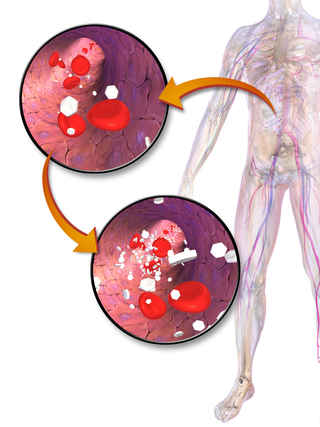
Hyperglycemia is a condition in which an excessive amount of glucose circulates in the blood plasma. This is generally a blood sugar level higher than 11.1 mmol/L (200 mg/dL), but symptoms may not start to become noticeable until even higher values such as 13.9–16.7 mmol/L (~250–300 mg/dL). A subject with a consistent fasting blood glucose range between ~5.6 and ~7 mmol/L is considered slightly hyperglycemic, and above 7 mmol/L is generally held to have diabetes. For diabetics, glucose levels that are considered to be too hyperglycemic can vary from person to person, mainly due to the person's renal threshold of glucose and overall glucose tolerance. On average, however, chronic levels above 10–12 mmol/L (180–216 mg/dL) can produce noticeable organ damage over time.

The American Heart Association (AHA) is a nonprofit organization in the United States that funds cardiovascular medical research, educates consumers on healthy living and fosters appropriate cardiac care in an effort to reduce disability and deaths caused by cardiovascular disease and stroke. They are known for publishing guidelines on cardiovascular disease and prevention, standards on basic life support, advanced cardiac life support (ACLS), pediatric advanced life support (PALS), and in 2014 issued the first guidelines for preventing strokes in women. The American Heart Association is also known for operating a number of highly visible public service campaigns starting in the 1970s, and also operates several fundraising events.
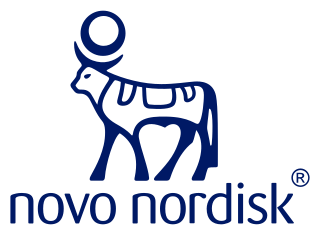
Novo Nordisk A/S is a Danish multinational pharmaceutical company headquartered in Bagsværd with production facilities in nine countries and affiliates or offices in five countries. Novo Nordisk is controlled by majority shareholder Novo Holdings A/S which holds approximately 28% of its shares and a majority (77%) of its voting shares.
Parkinson's UK is a Parkinson's research and support charity in the United Kingdom. In April 2010, the Parkinson's Disease Society changed its name to become Parkinson's UK. Its aims are to improve the quality of life for people affected by Parkinson's and find a cure for the condition.

Beat is the UK's leading charity supporting those affected by eating disorders and campaigning on their behalf. Founded in 1989 as the Eating Disorders Association, it celebrated its 30th anniversary in 2019.
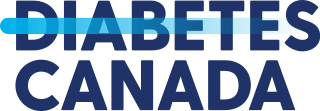
Diabetes Canada is a registered national charity whose mission includes serving the 11 million Canadians living with diabetes or prediabetes. Diabetes Canada programs include:

Type 1 diabetes (T1D), formerly known as juvenile diabetes, is an autoimmune disease that originates when cells that make insulin are destroyed by the immune system. Insulin is a hormone required for the cells to use blood sugar for energy and it helps regulate glucose levels in the bloodstream. Before treatment this results in high blood sugar levels in the body. The common symptoms of this elevated blood sugar are frequent urination, increased thirst, increased hunger, weight loss, and other serious complications. Additional symptoms may include blurry vision, tiredness, and slow wound healing. Symptoms typically develop over a short period of time, often a matter of weeks if not months.
The term diabetes includes several different metabolic disorders that all, if left untreated, result in abnormally high concentrations of a sugar called glucose in the blood. Diabetes mellitus type 1 results when the pancreas no longer produces significant amounts of the hormone insulin, usually owing to the autoimmune destruction of the insulin-producing beta cells of the pancreas. Diabetes mellitus type 2, in contrast, is now thought to result from autoimmune attacks on the pancreas and/or insulin resistance. The pancreas of a person with type 2 diabetes may be producing normal or even abnormally large amounts of insulin. Other forms of diabetes mellitus, such as the various forms of maturity-onset diabetes of the young, may represent some combination of insufficient insulin production and insulin resistance. Some degree of insulin resistance may also be present in a person with type 1 diabetes.
Hyperosmolar hyperglycemic state (HHS), also known as hyperosmolar non-ketotic state (HONK), is a complication of diabetes mellitus in which high blood sugar results in high osmolarity without significant ketoacidosis. Symptoms include signs of dehydration, weakness, leg cramps, vision problems, and an altered level of consciousness. Onset is typically over days to weeks. Complications may include seizures, disseminated intravascular coagulopathy, mesenteric artery occlusion, or rhabdomyolysis.
A diabetic diet is a diet that is used by people with diabetes mellitus or high blood sugar to minimize symptoms and dangerous complications of long-term elevations in blood sugar.
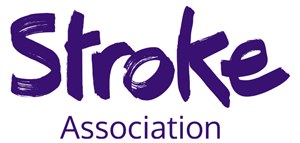
The Stroke Association is a charity in the United Kingdom. It works to prevent stroke, and to support everyone touched by stroke, fund research, and campaign for the rights of stroke survivors of all ages.

The Royal Osteoporosis Society (ROS), formerly the National Osteoporosis Society, established in 1986, is the only UK-wide charity dedicated to improving the prevention, diagnosis and treatment of osteoporosis. It is based in Camerton, Somerset, England.

Globally, an estimated 537 million adults are living with diabetes, according to 2019 data from the International Diabetes Federation. Diabetes was the 9th-leading cause of mortality globally in 2020, attributing to over 2 million deaths annually due to diabetes directly, and to kidney disease due to diabetes. The primary causes of type 2 diabetes is diet and physical activity, which can contribute to increased BMI, poor nutrition, hypertension, alcohol use and smoking, while genetics is also a factor. Diabetes prevalence is increasing rapidly; previous 2019 estimates put the number at 463 million people living with diabetes, with the distributions being equal between both sexes icidence peaking around age 55 years old. The number is projected to 643 million by 2030, or 7079 individuals per 100,000, with all regions around the world continue to rise. Type 2 diabetes makes up about 85-90% of all cases. Increases in the overall diabetes prevalence rates largely reflect an increase in risk factors for type 2, notably greater longevity and being overweight or obese. The prevalence of African Americans with diabetes is estimated to triple by 2050, while the prevalence of whites is estimated to double. The overall prevalence increases with age, with the largest increase in people over 65 years of age. The prevalence of diabetes in America is estimated to increase to 48.3 million by 2050.

Diabetes mellitus, often known simply as diabetes, is a group of common endocrine diseases characterized by sustained high blood sugar levels. Diabetes is due to either the pancreas not producing enough insulin, or the cells of the body becoming unresponsive to the hormone's effects. Classic symptoms include thirst, polyuria, weight loss, and blurred vision. If left untreated, the disease can lead to various health complications, including disorders of the cardiovascular system, eye, kidney, and nerves. Untreated or poorly treated diabetes accounts for approximately 1.5 million deaths every year.
Diabetes.co.uk is a British-based website that offers news, information and resources on diabetes, describing itself as "Europe's largest community of people with diabetes".
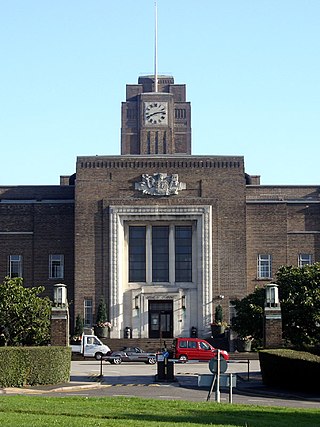
Rowan Mary Hillson is a British endocrinologist who established a pioneering diabetes service at Hillingdon Hospital, and was National Clinical Director for Diabetes at the Department of Health. She is the author of several books on diabetes and endocrinology.

Brian M. Frier is a Scottish physician, diabetologist, clinical scientist, and an Honorary Professor of Diabetes at the University of Edinburgh. He is best known for his many scientific contributions to the pathophysiological understanding of hypoglycemia, a common adverse effect of insulin therapy in diabetic patients whose societal impact has deserved increasing media attention worldwide. His honors include the R.D. Lawrence Lecture of the British Diabetic Association in 1986, the Banting Memorial Lecture at Diabetes UK in 2009, the Camillo Golgi Prize and lecture at the 53rd annual EASD conference in 2017, and the Michael Somogyi Award from the Hungarian Diabetes Association in 2004. Frier is a science book author and editor, and a science journal Chief editor. He is also regarded as an authority on the field of driving and diabetes. In 2023, Frier was accorded Honorary Life Membership by the European Association of Diabetes.
The Joint British Diabetes Societies for Inpatient Care group (JBDS-IP) was formed in 2008.













